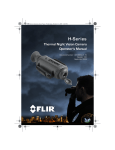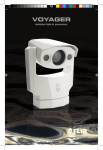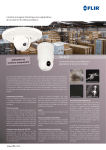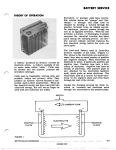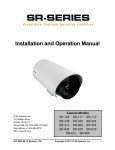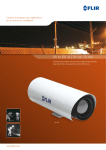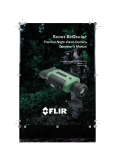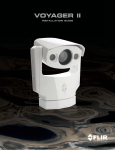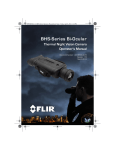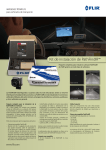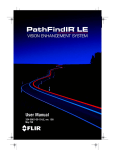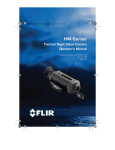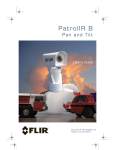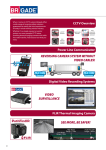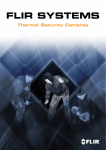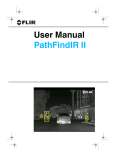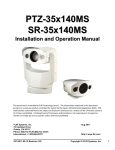Download PathFindIR Aftermarket User Manual
Transcript
PathFindIR® Aftermarket User Manual 334-0001-00-10, Version 130 October 2009 © 2009 FLIR Commercial Vision Systems, Inc.. All rights reserved worldwide. No parts of this manual, in whole or in part, may be copied, photocopied, translated, or transmitted to any electronic medium or machine readable form without the prior written permission of FLIR Commercial Vision Systems, Inc. Names and marks appearing on the products herein are either registered trademarks or trademarks of FLIR Commercial Vision Systems, Inc. and/or its subsidiaries. All other trademarks, trade names, or company names referenced herein are used for identification only and are the property of their respective owners. This product is protected by patents, design patents, patents pending, or design patents pending. This equipment must be disposed of as electronic waste. Contact your nearest FLIR Commercial Vision Systems, Inc. representative for instructions on how to return the product to FLIR for proper disposal. This document is controlled to FLIR Technology Level EAR 1. The information contained in this document is proprietary and/or restricted and pertains to a dual use product controlled for export by the Export Administration Regulations (EAR). This document and data disclosed herein or herewith is not to be reproduced, used, or disclosed in whole or in part to anyone without the written permission of FLIR Systems, Inc. Diversion contrary to US law is prohibited. US Department of Commerce authorization is not required prior to export or transfer to foreign persons, parties, or uses otherwise prohibited. FLIR Commercial Vision Systems, Inc. 70 Castilian Drive Goleta, CA 93117 Phone: 1-888-747-FLIR (3547) www.flir.com Table of Contents 1 Warnings and Cautions 1.1 Cautions ................................................................................................................................. 1 1.2 General Information ......................................................................................................... 2 2 Introduction 2.1 Overview ................................................................................................................................ 3 2.2 Thermal Imaging Driver Vision Enhancement System .................................... 3 2.3 What is Thermal Imaging? ........................................................................................... 5 2.4 Vehicles that use PathFindIR Systems ................................................................... 5 2.5 PathFindIR Camera Model Numbers ...................................................................... 6 2.6 Full Feature PathFindIR Camera ................................................................................ 7 3 Getting Started 3.1 Using your PathFindIR Camera .................................................................................. 9 3.2 Initial System Startup ...................................................................................................... 9 3.3 Heater Element ............................................................................................................... 10 3.4 Automatic Shutter ......................................................................................................... 10 3.5 In Case of Difficulty ........................................................................................................ 10 3.6 Troubleshooting .............................................................................................................. 11 4 Caring for your PathFindIR System 4.1 Product Cleaning ............................................................................................................ 13 4.2 Temperature .................................................................................................................... 13 4.3 Maintenance .................................................................................................................... 14 5 Options and Accessories 5.1 Accessories ...................................................................................................................... 15 5.2 Aftermarket Installation Kit ....................................................................................... 17 5.3 Bench Top Kit .................................................................................................................. 19 6 Installation 6.1 PathFindIR System Installation ................................................................................ 21 6.2 Preparation ....................................................................................................................... 21 6.3 Installation ......................................................................................................................... 22 6.4 Installation Guidelines and Precautions .............................................................. 22 6.5 Installation Assistance ................................................................................................. 24 6.6 Mounting Assistance ................................................................................................... 24 7 Technical Data 7.1 Performance Specification ........................................................................................ 25 7.2 Side Views ......................................................................................................................... 26 7.3 Front View ......................................................................................................................... 27 334-0001-00-10, version 130 iii iv October 2009 1 Warnings and Cautions 1.1 Cautions Caution! This guide uses the term Caution to indicate a potentially hazardous situation, which, if not avoided, may result in injury, damage to the vehicle or PathFindIR system, or other property damage. Caution! The PathFindIR thermal imaging system is designed for commercial, over the road, automotive applications. While many other applications are possible, you must carefully consider additional protection and installation methods that might be required for any given application. Mechanical, environmental and electrical requirements should be evaluated to assure that the PathFindIR system can be utilized with satisfactory results. Do not operate any function that takes your attention away from safely driving your vehicle. Any function that requires your prolonged attention should only be performed after coming to a complete stop. Always stop the vehicle in a safe location before performing these functions. Failure to do so may result in an accident. Consult your local and state driving regulations prior to installation. In many states using active monitors in view of the driver is prohibited. Consult your local and state driving regulations for laws and guidelines. User assumes all risks and indemnifies the manufacturer from any liability. Minimize display viewing while driving. Viewing the display may distract you from looking ahead and may result in an accident. Do not use the PathFindIR thermal imaging system as a substitute for headlights or headlight assisted human vision during vehicle operation. Use this product for mobile 12v applications. The PathFindIR system is designed for the automotive 12 VDC power environment and conforms to ISO 7637-2 requirements for transients and disturbances on the typical automotive power system. If the PathFindIR system is installed in applications other than commercial automobiles, additional power conditioning or protection may be required. When installing the PathFindIR camera, do not block the vehicle’s vents or radiator panels. Doing so may result in heat buildup, equipment breakage, and/or fire. 334-0001-00-10, version 130 1 1 – Warnings and Cautions 1.2 General Information Caution! The PathFindIR thermal imaging system is not intended to be used as the primary navigation system. The PathFindIR system should not to be used as a substitution for headlights or headlight assisted human vision during vehicle operation. It should be used only as an aid to cautious night-time driving. Do not open the camera body for any reason. Disassembly of the camera (including removal of the cover) can cause permanent damage and will void the warranty. Operating the camera outside of the specified input voltage range or the specified operating temperature range can cause permanent damage. Do not image extremely high intensity radiation sources, such as the sun, lasers, arc welders, etc. The camera is a precision optical instrument and should not be exposed to excessive shock and/or vibration. Refer to paragraph 7.1 “Performance Specification” on page 25 for detailed environmental requirements. Great care should be used with your camera optics. They are delicate and can be damaged by improper cleaning. Refer to Chapter 4 “Caring for your PathFindIR System” on page 13. Normal wear can be expected and scratches and small pits in the window from normal wear will not usually adversely affect the image displayed on the monitor. Note All thermal imaging systems are subject to export control. Please contact FLIR for export compliance information concerning your application or geographic area. 2 October 2009 2 Introduction 2.1 Overview Congratulations! You have purchased one of the most sophisticated and important instruments you will have on your vehicle. The FLIR PathFindIR camera is a state-of-the-art thermal imaging system that will provide you with excellent night visibility and situational awareness, even in absolute darkness. The PathFindIR camera system is designed for simple, intuitive operation. The PathFindIR camera is a sophisticated thermal sensor that converts thermal content (heat) of a scene into a 2-dimensional image for display on a video monitor inside your vehicle. 2.2 Thermal Imaging Driver Vision Enhancement System The PathFindIR camera is designed to provide enhanced vision and better situational awareness for the driver during normal night time driving and in adverse weather conditions than with traditional headlights alone. Many serious accidents occur at night because the driver is not able to see the cause of the accident in time to prevent the collision. PathFindIR systems directly address this problem, allowing drivers to see farther ahead on nighttime roadways and identify potential problems earlier. Humans and other warm blooded animals offer significant thermal contrast to driving backgrounds and are easy to spot with the PathFindIR camera. The system allows drivers to see without any additional lighting and provides real-time imaging at any speed. Different than visible light cameras, thermal imagers do not display reflected light as seen with human eyes. Rather, thermal imaging cameras only 'see' temperature differences which are converted into shades of grey, from black to white. The PathFindIR camera in the standard configuration displays cold objects as black and hot objects as white. When using a thermal imager in darkness, the image is created based on temperature differences of objects in the field of view, rather than reflected light from headlights. Because thermal imaging cameras only 'see' heat sources and not reflected light, they are ideal to assist with driver vision and situational awareness for oncoming obstructions such as animals, people, and other vehicles 334-0001-00-10, version 130 3 2 – Introduction The above images show comparisons of typical night time driving compared to using the PathFindIR thermal imager. The image on the left is from an ordinary digital camera and shows the amount of visible light; the image on the right is a thermal image created by the PathFindIR thermal imaging camera. Note the PathFindIR camera is sensitive to warm objects, such as pedestrians, and provides visibility over a much greater distance. Some of the objects that are most critical for a driver to avoid are people and animals. Because these objects are naturally warm, they are particularly easy to see with the PathFindIR system and clearly stand out in the video image. Although adverse conditions such as heavy fog will affect any driver vision enhancement system, thermal imaging cameras such as the PathFindIR camera have been shown to continue to provide useful information in conditions of reduced visibility, such as haze and smoke. While the PathFindIR 4 October 2009 2 – Introduction camera can assist drivers with detection of obstructions in the vehicle’s path, thermal imagers should not be used as the sole vision method of the driver. PathFindIR cameras are specifically designed for the harsh automotive environment, with a hermetically-sealed external housing resistant to rocks, sand, salt, and under-hood contaminants. Additionally, the wide operating temperature range allows the PathFindIR camera to maintain high performance in severe weather conditions. 2.3 What is Thermal Imaging? With our eyes, we see visible light. With a thermal imager, we can see infrared—a form of light just beyond the visible spectrum. Thermal imagers show subtle differences in temperature; with a PathFindIR camera in the standard configuration, warm objects appear white and cooler objects appear black. In addition to driver vision enhancement, FLIR's thermal imaging cameras are used in a wide variety of applications—fire fighting, security, maritime, industrial, and medical applications. They continue to be used by militaries worldwide to navigate at night and in battlefield conditions. Over the last few years, volume production of these systems has allowed FLIR to offer the same high performance cameras designed for military use to the commercial market. 2.4 Vehicles that use PathFindIR Systems Passenger Vehicles, Commercial Trucks, Buses, Construction, Mining, and Recreational Vehicles - PathFindIR systems can increase the detection time for hazards and reduce the probability of an accident—saving lives, property, and profits. Emergency Vehicles - The high speeds and degraded stopping distances of Emergency vehicles increase the chance of an accident. PathFindIR systems improve hazard detection at high speeds. Commuter and Freight Trains - PathFindIR systems can reveal railway obstructions at long ranges in complete darkness. This early detection capability can significantly increase the warning time depending on the size of the obstruction. Heavy Construction and Mining Vehicles - For heavy equipment navigation, PathFindIR systems improve awareness in conditions that render eyesight and daylight cameras useless. The PathFindIR camera can see clearly through dust and smoke, increasing safety for everyone on the job site. 334-0001-00-10, version 130 5 2 – Introduction 2.5 PathFindIR Camera Model Numbers Standard PathFindIR Camera 334-0001-00 PathFindIR, 30Hz, NTSC 334-0001-00S PathFindIR, 7.5Hz, NTSC 334-0001-00P PathFindIR, 25Hz, PAL 334-0001-00PS PathFindIR, 8.3Hz, PAL Full Feature PathFindIR Camera 334-0008-00 PathFindIR FF, 30Hz, NTSC 334-0008-00S PathFindIR FF, 7.5Hz, NTSC 334-0008-00P PathFindIR FF, 25Hz, PAL 334-0008-00PS PathFindIR FF, 8.3Hz, PAL Note All thermal imaging systems are subject to export control. Standard NTSC (30Hz) and PAL (25Hz) units are subject to export restrictions and licensing by the United States Government. Models with video frame rates at or below 9Hz do not require licensing but do require compliance with other export requirements. Please contact FLIR for details concerning export compliance for your application or geographic area. 6 October 2009 2 – Introduction 2.6 Full Feature PathFindIR Camera The Full Feature PathFindIR camera is provided for OEMs and installers who want to utilize custom features for their applications. The additional features available on the Full Feature PathFindIR camera are selected and set via a LIN (local interconnect network) communications channel. The white wire in the standard PathFindIR System Cable (308-0159-00) provides the means to send the LIN commands to the PathFindIR camera. The additional custom features provided by the Full Feature PathFindIR camera include the following: • • Selectable color palettes—white hot, black hot, sepia, and rainbow Selectable automatic gain control (AGC)—four AGC settings can be selected • Additional signal outputs for 8-bit digital video data, clock signal, and sync signal requires OEM cable 308-0152-00. • 2× Zoom—The central part of the image is magnified twice its normal size. • LIN command to restore factory defaults If you have purchased the Full Feature PathFindIR camera and need information on these functions, contact your FLIR representative and request the Electrical Interface Control Document (ICD) that describes the connector interface and the proper formatting of the commands controlling these additional functions. A non-disclosure agreement (NDA) is required in order for FLIR to provide this document. Note The ICD describes the FLIR serial commands for the PathFindIR camera. An aftermarket serial to LIN level shifter is required to convert the serial commands LIN protocol and may further require client supported software (for example an SDK). FLIR does not make recommendations for hardware and cannot provide information or support for third party software use or modification outside of the information provided in the ICD. 334-0001-00-10, version 130 7 2 – Introduction 8 October 2009 3 Getting Started The thermal imaging core inside the PathFindIR camera is completely sealed and extremely rugged. The camera has been qualified for operation in all types of weather conditions over the specified operating temperature range and includes an automatic window heater that will prevent icing under most conditions. 3.1 Using your PathFindIR Camera The PathFindIR camera is easy to use, but you should take a moment to carefully read this section so you fully understand what you are seeing on your display monitor. While the imagery you will see on the monitor may look like black and white daylight video, it isn’t! A few tips on how to interpret some of the imagery will help you to make the most of your system. The camera automatically adjusts to changing scene conditions so no additional camera control is necessary. Scenes with familiar objects will be easy to interpret with some experience. The camera automatically optimizes the image to provide you with the best contrast in most conditions. The thermal imager inside the camera does not sense light like conventional cameras; it senses heat or temperature differences. As you experiment with the system during nighttime operation, you will notice variances in the “picture quality”; this is normal. The camera senses small “differences” in apparent radiation from the objects in view, and in the standard configuration displays them as either white (or lighter shades of gray) for warmer objects, and black (or darker shades of gray) for colder objects. 3.2 Initial System Startup The PathFindIR camera requires a standard 12 VDC power source and a connection to an external monitor to provide imagery. Make sure to test the system prior to installation to assure the system is functioning properly. Be sure to remove the protective window sticker prior to test and installation. Upon initial power up you will hear a slight clicking sound. This click is the internal image correction. This noise is the mechanical shutter assembly which will cause the image to momentarily “freeze.” This noise and image freezing will occur until the unit has reached a thermally stable temperature and periodically thereafter. See “Automatic Shutter” on page 10. 334-0001-00-10, version 130 9 3 – Getting Started 3.3 Heater Element The PathFindIR camera has a built-in heating element to stabilize the window and prevent ice build-up in cold weather conditions. The heating element is automatically turned on when the temperature of the window falls below 4ºC and is tuned off when the temperature reaches 6ºC. 3.4 Automatic Shutter The PathFindIR camera incorporates an automatic image correction feature via the internal calibration shutter. This shutter will activate every 2 minutes or more frequently during initial start up and large environmental temperature changes. During this function the image will be “frozen” for approximately half a second. The frozen image will display a small white box in the upper left corner of the image during this calibration, as shown in the image above. 3.5 In Case of Difficulty The PathFindIR camera comes with a 24 month limited warranty from the date of purchase. DO NOT OPEN, MODIFY, or ALTER the PathFindIR camera or accessories. Doing so will void any warranty and may cause system malfunction, loss of performance, fire, or bodily harm. The PathFindIR system is a highly sophisticated electronic imaging system. Should the system fail for any reason do not attempt to fix the system or wiring cables yourself. Check wiring connections, power input, video output. If system is not performing please contact the manufacture at +1.888.747.3547 or +1.805.964.9797 and ask to speak to the service department. You will need the serial number of the unit to obtain a Return Material Authorization (RMA). 10 October 2009 3 – Getting Started 3.6 Troubleshooting No Video but the system is running and has power supplied to it. Place your ear next to the PathFindIR camera. If you hear the mechanical shutter (clicking noise, see section 3.2 “Initial System Startup” on page 9) but you are not getting an image, check the video connections. The PathFindIR camera works with most standard NTSC or PAL monitors that have 75 ohm input. No Video, no clicking. If video is not displayed and you do not hear a “clicking” sound from the PathFindIR camera, check the power inputs. The camera runs on +6 VDC to +16 VDC power through one of the optional power/video cables. If this voltage range is not adhered to the unit will not function and may be damaged. The image is cloudy or hazy, or the window has fog or ice built up. The PathFindIR camera is equipped with an automatic heating element which turns on at cold temperatures. The heater requires a few moments to stabilize the window. Once the window is thermally stabilized the heating element will turn off automatically. The image has "lines" or screen door appearance. Check to see if the image “freezes” or if you hear a mechanical “clicking noise” from the PathFindIR camera. If you do not see the image freeze momentarily (this may take a few minutes), the internal shutter may be damaged. Contact the manufacturer. The image is shaky. Check your mounting. The PathFindIR camera does not incorporate image stabilization and must be mounted securely. Image is dim. Check your monitor and video connections. It is recommended that you use separate power supplies for the PathFindIR camera and the local display monitor to make sure you have clean uninterrupted power. Also, verify the PathFindIR camera is connected to the 75 ohm input on the monitor. The image may be dim if the camera is connected to an input that requires a different impedance. 334-0001-00-10, version 130 11 3 – Getting Started The image is dark and no objects are seen. Recycle the power and see if you get the “Splash Screen” (as seen below) on the display monitor. If you get the Splash Screen but no image afterwards (only a black screen), check to make sure that the window is clear of all obstructions (refer to the maintenance section for information on window cleaning). If you do not see the Splash Screen, check the power input and video output. If you see the Splash Screen but no image afterwards, it is possible the mechanical shutter is stuck in the on position. Contact FLIR customer service for additional help. Figure 3-1: Startup Splash Screen 12 October 2009 4 Caring for your PathFindIR System 4.1 Product Cleaning Caution! Do not open the camera body for any reason. Disassembly of the camera (including removal of the cover) can cause permanent damage and will void the warranty. Your PathFindIR camera images through an infrared transparent window. This window is designed for the harsh automotive environment of normal driving, but may require occasional cleaning. FLIR Commercial Vision Systems, Inc. suggests that you clean the window of the PathFindIR camera when image quality degradation is noticed or excessive contaminant build-up is seen on the window. Note During normal use the camera window may become scratched or develop small pits. These usually will not cause a noticeable degradation of the displayed image. The camera housing has a durable coating and the rugged protective window is designed to withstand normal cleaning. Rinse the camera housing with low pressure fresh water to keep it clean. If the front window of the PathFindIR camera gets water spots, wipe it with a clean soft cotton cloth dampened with fresh water. If the window requires further cleaning, use a soft moist cottonbased cloth with isopropyl alcohol or dish soap. Do not use abrasive materials, such as paper or scrub brushes as this will possibly damage the window by scratching it. Only clean the window when you can visually see contamination on the surface. 4.2 Temperature The PathFindIR camera has an operating temperature range of -40 to 80oC. Choose an installation location so that the PathFindIR camera is not subject to temperature extremes that exceed this range. 334-0001-00-10, version 130 13 4 – Caring for your PathFindIR System 4.3 Maintenance If you have problems do not attempt to repair the PathFindIR system yourself. The PathFindIR camera is a water-tight sealed unit and can not be opened or serviced in the field. Consult your installation dealer or FLIR Systems Inc. for repair information. If the camera will not produce an image, check the video connection at the camera and at your display monitor. If the connectors appear to be properly engaged but the camera still does not produce an image, have an authorized service representative make the appropriate repairs. Front Window Figure 4-1: Front Window Caution! Improper care of the camera window can cause damage to the anti-reflective coating, degrade the camera’s performance, and void the camera warranty. 14 October 2009 5 Options and Accessories 5.1 Accessories Camera options and accessories are subject to change. Refer to the FLIR web site http://www.flir.com or contact your local dealer to obtain up-to-date information regarding available accessories such as mounting kits, monitor options, cables, and accessories. PathFindIR System Cable: 308-0159-00 The standard 20-foot system cable ensures a sealed connection to the PathFindIR camera—a requirement for harsh vehicle environments. The cable has a sealed PathFindIR connector at one end; two power leads (red and black), a communications lead (white), and a BNC video connector at the other end. To Camera Video output White Communications Black 12 VDC (-) Red 12 VDC (+) For standard operation the white communications lead can be clipped off or dressed back and secured out of the way—it is not used. Refer to paragraph 2.6 “Full Feature PathFindIR Camera” on page 7 for a description of applications that utilize the PathFindIR camera communications feature. 334-0001-00-10, version 130 15 5 – Options and Accessories PathFindIR Universal Mounting Bracket: 261-1470-00 The Universal Mounting Bracket is shown below with the PathFindIR camera inserted, but not secured. The bracket has mounting holes on all four sides providing flexibility in choosing a mounting location. The camera has two pivot posts that are inserted into slots allowing about 45° of adjustment. A kit of mounting hardware is provided with the bracket. There are two M4 × 0.7 metric screws with washers and lockwashers to secure the camera to the bracket and four ¼ × 20 bolts and lockwashers for attaching the bracket to the vehicle. Universal Mounting Bracket ¼ × 20 threaded insert sixteen places Screw slot Pivot post PathFindIR camera 16 October 2009 5 – Options and Accessories 5.2 Aftermarket Installation Kit The FLIR Aftermarket Installation Kit, part number 421-0029-00, is made available to facilitate installation in most vehicle applications and includes a video monitor, cables, and mounting hardware. The kit will work with any PathFindIR camera, which while included and shipped in the kit must be selected and purchased separately. The kit contains: • • • • • • Universal Mounting Bracket and hardware: 261-1470-00 PathFindIR System Cable: 308-0159-00 Safety Vision 7” Monitor with Mounting Bracket and Sun Shield: 4105734 Video Interface Cable: 4105735 PathFindIR User Manual and CD ROM (not shown) PathFindIR Camera (chosen and purchased separately) Mounting bracket Monitor Video interface cable PathFindIR interface cable PathFindIR camera (purchased separately) Any of the components supplied in this kit can also be purchased separately. Note that the monitor part number 4105734 will require the video interface cable part number 4105735 to operate properly. 334-0001-00-10, version 130 17 5 – Options and Accessories The following schematic shows how to connect the PathFindIR system using the cables in the Aftermarket Installation Kit. PathFindIR Camera (sold separately) 4105734 Monitor Monitor Cable (part of 4105734) System Cable 308-0159-00 green - not used red - power (+) black - power (-) Video Interface Cable 4105735 red - power (+) black - power (-) white - communications (not used for standard installation) 18 October 2009 5 – Options and Accessories 5.3 Bench Top Kit The optional FLIR Bench Top Kit, part number 421-0027-00, is made available for those who want to operate the PathFindIR system from a 110/240VAC power source, for lab testing or for applications where standard AC power is available. Using the PathFindIR system with the Bench Top Kit requires a monitor (not supplied) having a 75-ohm video input. The kit will work with any PathFindIR camera, which must be purchased separately. The kit contains: • • • • Bench Top Mounting Bracket: 261-1418-00 PathFindIR Bench Top Cable: 308-0142-00 110/240 VAC to 9VDC power supply: 206-0001-20 110 VAC Line cord for 9VDC power supply: 208-0004-02 PathFindIR camera (not included) Bench top mounting bracket Power supply 206-0001-20 PathFindIR bench top cable Line cord 208-0004-02 Any of the components supplied in this kit can also be purchased separately. 334-0001-00-10, version 130 19 5 – Options and Accessories The following schematic shows how to connect the PathFindIR system using the cables in the Bench Top Kit. PathFindIR Camera (sold separately) Bench Top Cable 308-0142-00 AC Power Source Power Supply 206-0001-20 BNC Video out Please contact FLIR or your local dealer/installer for the latest information on PathFindIR system accessories. 20 October 2009 6 Installation 6.1 PathFindIR System Installation Caution! The PathFindIR thermal imaging system is designed for commercial, over the road, automotive applications. While many other applications are possible, each user should carefully consider additional protection and installation methods that might be required for any given application. Mechanical, environmental, and electrical requirements should be evaluated to assure that the PathFindIR system can be utilized with satisfactory results. The PathFindIR camera is a compact, sealed imaging system that fits easily behind vehicle grilles and in other compact locations. It includes an internal heater to keep the lens clear in icy conditions, and delivers superior image quality. It can be ordered as a camera module alone, with a commercial grade cable, mounting bracket, or as part of a complete installation kit. The PathFindIR camera must be mounted in a location where it is not obstructed by the windshield or other glass materials. Although glass is transparent to the human eye, it is opaque in the infrared spectrum. The PathFindIR should be installed by an installer or dealer trained by FLIR Commercial Vision Systems, Inc. If one is not available in your area we recommend that you use a reputable car audio/video installation shop that specializes in mobile video system integration. The wiring and installation requires special care and integration techniques. Improper installation may result in damage to the camera and may void the warranty. Some modifications to the vehicle’s exterior may be required, as well as integration into various display monitor units, including factory LCD or aftermarket multi-functional units. 6.2 Preparation The PathFindIR standard 20-foot system cable has two open power leads—red, 12 VDC (+); black, 12 VDC (-)—for connecting to a power source of 6 –16 VDC. The cable also includes a white wire and a BNC male adapter. The white wire is not used for standard installations. It can be clipped off or dressed back and secured out of the way. This wire is only used for Full Feature camera installations as described in paragraph 2.6 “Full Feature PathFindIR Camera” on page 7. Refer to the model number to determine your specific PathFindIR camera analog video output format. See “PathFindIR Camera Model Numbers” on page 6. 334-0001-00-10, version 130 21 6 – Installation It is recommended that power to the monitor be supplied separately from power to the PathFindIR camera to assure clean (low noise) power to both components. Otherwise the video image may appear to have interference, ghosting, or undesirable video artifacts. 6.3 Installation Caution! Before wiring the camera, disconnect all power from the battery. Failure to do so may result in shock, bodily harm, or damage to the vehicle, camera, or accessories. Installation using incorrect connections may result in system malfunction or risk of shock. FLIR Commercial Vision Systems, Inc. recommends the standard 20-foot system cable for proper installation (refer to paragraph 5.1 “Accessories” on page 15). This cable is sealed and provides two power input leads, a communications lead (used only for Full Feature camera installation), and video output via the connected BNC adapter. The proper mating connector must be used when installing the PathFindIR camera. The use of other connectors may result in damage to the camera that is not covered by the limited product warranty. The standard 20-foot system cable has a BNC connector for video output. You may need to purchase connectors/converters to connect to aftermarket or factory-installed video monitors. 6.4 Installation Guidelines and Precautions Caution! Supplying power to the unit outside of the recommended and stated values will result in system malfunction and void the warranty. This may also result in excessive heat build up, shock, or fire. Note For standard installations, the white communications wire is not used. If you are installing a Full Feature camera system, refer to paragraph 2.6 “Full Feature PathFindIR Camera” on page 7. Do not splice cables or tap into existing cables for power or video. Doing so may result in shock, fire, or damage to electrical system/equipment. Power 22 October 2009 6 – Installation connections should be made to the fused side of the vehicle’s power distribution block. Do not install in areas where the unit will hinder vehicle operation, i.e. radiator, steering, headlights, braking systems. Doing so may interfere with the vehicle's operation and cause an accident. Do not install in areas of high moisture, dust or air intake paths. Doing so may hinder the performance of the PathFindIR unit and cause image degradation or window damage. Use only authorized parts and accessories. Doing so helps assure proper mounting and connectivity and limits external issues associated with poorly secured mounting and wiring. Disconnect the negative (-) battery terminal prior to installation. Connect the unit to the vehicle power distribution block using an available fused (2 amp) connection. Be sure to connect each lead to the correct polarity (redpositive and black-negative). Caution! The PathFindIR system is designed for the automotive 12 VDC power environment and conforms to ISO 7637-2 requirements for transients and disturbances on the typical automotive power system. If the PathFindIR system is installed in applications other than commercial automobiles, additional power conditioning or protection may be required. Be sure to securely mount the system to assure reliable connections and stable system performance. Record the serial number, date of purchase, location of purchase and keep this record in a safe place. Do not mount a display monitor where it will distract the driver or adversely affect the driver’s vision. 334-0001-00-10, version 130 23 6 – Installation 6.5 Installation Assistance FLIR offers the Aftermarket Installation Kit which is suitable for many applications. Refer to paragraph 5.2 “Aftermarket Installation Kit” on page 17 for more information about installing the camera with the kit. If your company has applications utilizing a large number of PathFindIR cameras on a specific vehicle please contact FLIR Commercial Vision Systems, Inc. directly to discuss your needs. 6.6 Mounting Assistance The following are some general guidelines which will assist your professional service and installer with good mounting positions and connections. The PathFindIR camera is a thermal imaging system. As such, it will not “see through” windows or obstructions. The camera should be mounted outside the vehicle's cabin (interior) and in such a location to assure a similar driving field of view as normal headlights and human vision. Carefully position and adjust the camera mounting so that the largest area of interest (road and roadside) are in the field of view. If the camera is pointed too low, the range will be limited. If the camera is pointed too high, too much of the sky will be in the field of view limiting the usable information and reducing the effectiveness of the PathFindIR AGC (automatic gain control) function. Caution! Contact your vehicle manufacture to assure that your mounting location does not affect any sensors found in bumpers or grilles (such as for air bag deployment devices). Mounting the PathFindIR system components should never interfere with the mechanical or electrical components, or airways to maintain vehicle performance or operations. FLIR Commercial Vision Systems, Inc. is not liable for any modifications made to the vehicle's body, or aftermarket parts. Owner assumes all risk when modifying vehicles body, frame, grille, or any other structure. Care should be taken when drilling or cutting into parts. Mounting should be performed by a FLIR-authorized service center or professional installer of automotive aftermarket equipment. Many shops familiar with rear vision cameras will be able to assist in the mounting and location of the PathFindIR system, as well as proper display monitor mounting and integration. 24 October 2009 7 Technical Data 7.1 Performance Specification Thermal Imaging Performance Sensor type Uncooled microbolometer Field of view 36° h x 27° v Spectral band 8 - 14 μ Resolution 320 x 240 pixels Time to Image < 2 sec. Focal Length 19 millimeters Outputs Video NTSC or PAL Connector types 12-pin automotive connector for power in, video out Frame Rate 30-Hz for NTSC Video, 25 Hz for PAL video Note: Hz is equivalent to 7.5-Hz for NTSC Video, 8.3 Hz for PAL video (< 9 Hz Export Compliant) frames per second Power Power requirements 12 Vdc nominal (range 6V to 16V) Power consumption 2 Watts (nominal) 6 Watts with window heater turned on Environmental Operating temperature -40º C to +80ºC Impact protection High-impact resistant window with heating element Weather Resistance Hermetically sealed, pressurized enclosure For additional information, contact FLIR. Dimensions and Weight Dimensions (Width × Height × Length) 58 mm × 57 mm × 72 mm (2.3” × 2.2” × 2.8”) excluding connector Connector adds 25.7 mm to height Weight less than 0.4 kg (0.88 lb.) Mounting Points one per side, M4 × 0.7 two 6 mm screws required 334-0001-00-10, version 130 25 7 – Technical Data 7.2 Side Views 26 October 2009 7 – Technical Data 7.3 Front View 334-0001-00-10, version 130 27 7 – Technical Data 28 October 2009 Santa Barbara Portland CVS World Headquarters FLIR Corporate Headquarters FLIR Systems, Inc. 70 Castilian Dr. Goleta, CA 93117 USA PH: +1.888.747.FLIR (+1.888.747.3547) FLIR Systems, Inc. 27700A SW Parkway Ave. Wilsonville, OR 97070 USA Netherlands CVS Eurasian Headquarters FLIR Commercial Vision Systems B.V. Charles Petitweg 21 4847 NW Teteringen - Breda The Netherlands



































